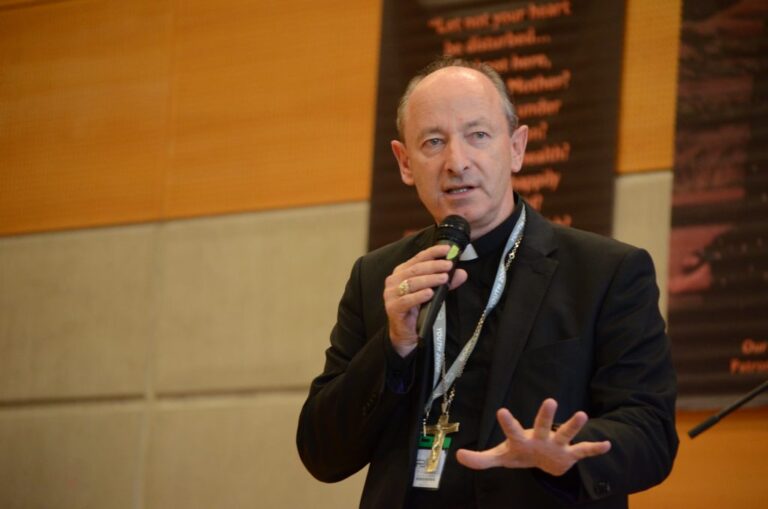Bishop of Waterford and Lismore, Alphonsus Cullinan, spoke critically of the “somewhat rushed” nature of synodal discussions across Ireland’s dioceses which led to critical issues going unaddressed and highlighted the perceived “mildly dismissive” attitude that adherents of a more traditional strand of Catholicism met in the national synthesis document.
In offering his reflections on the national synthesis document, Bishop Cullinan became the first Church leader in Ireland to question the competence of the Church in Ireland’s facilitation of the synodal process.
“Discussions or parish conversations or listening sessions or whatever one wishes to call them were completed under a certain pressure with little time to ensure deep reflection, have meaningful conversations and prayerful consideration of the questions posed on the themes of communion, participation and mission,” Bishop Cullinan said.
It was also the case that “a number of things emerge from the synthesis which challenge church teaching which she has held since the beginning”, he added.
Bishop Cullinan, speculating that conservative followers of the Faith may have felt a degree of alienation precipitated by the process, revealed that he had spoken to “many” who didn’t interact with the process at all: “From my own interaction with some ‘conservative’ or ‘traditional’ believers it was clear that many did not engage with the synodal process at a parish level – it would be interesting to research why this was so. Is it because they themselves feel marginalised? Or because they felt that Church teaching cannot be changed and that there was no need for this synodal process and that little fruit would ensue? Or perhaps they felt they simply had better things to do with their time?”
He suggested that “if the Church in Ireland is worried about groups on the margins of Irish society then we will have to dialogue in a more serious way with what might be termed ‘traditional Catholics’”.
Bishop Cullinan also emphasised that certain fundamental issues were not raised in the national synthesis and described the gaps that emerged as “quite staggering”.
“There is little or no mention of the poor, the sick, the homeless, drug abuse, the
environment (and this after a lot of work on Laudato Si), the unborn, the housing crisis, the Word of God, the social and ecumenical outreach of the Church,” he said.
On the national assembly in Athlone, which he attended with other Catholic bishops, he said “there was far too much introspection”. He left it “realising that we had heard very little on mission and the missionary outreach of the church”.
He wondered “where was the challenge to the prevailing culture of individualism and secularism? Are we just giving in to current trends and forgetting about the wisdom of past generations and the long tradition of the church?”
Bishop Cullinan also felt that “generally speaking many of the submissions from the 26 dioceses show a difference in emphases to the final synthesis”. This was, he said, “my subjective take on it and I do accept that there will always be different subjective attitudes at play in the writing up of any summary of people’s views.”
Findings in the report published by Waterford and Lismore diocese itself last June, following consultations at parish level, were broadly in line with those of other dioceses. It said that as an issue gender equality was “very visible throughout the conversations”.
Women, it said, “were considered to be powerhouses of the organisation but undervalued in their role within the Church.” It was asked “that women be allowed to be priests and deacons in the future”.
Young people asked that “the Church be more welcoming of the LGBTQ+ community” and were open “to the idea that the sacraments would be taught through a ‘Sunday School’ model in parishes” rather than “through the current school structure. Students said that the schools were doing the work of the Church.”
Lay involvement was seen as “a crucial element” to church and parish survival, “allowing the clergy to focus on the pastoral & sacramental side of parish life”. It was also noted, “that when Our Lady appeared in Knock, Fatima and Lourdes, she appeared to lay people and not to priests”.
As with the other dioceses, people in Waterford and Lismore also believed “priests should be allowed to marry if they wish”.
And, as in the other 25 dioceses, there too “the vast majority of those who gathered for the faith conversations were of the midlife to senior generations.” They concluded, “the hierarchical Church must now LISTEN [their emphasis], and, more importantly, ACT [their emphasis] on what has been said during these faith conversations”.



